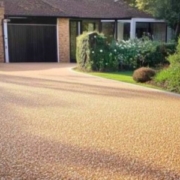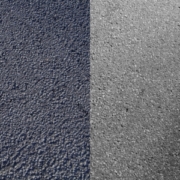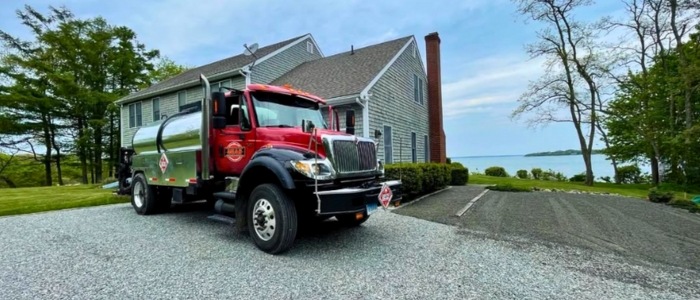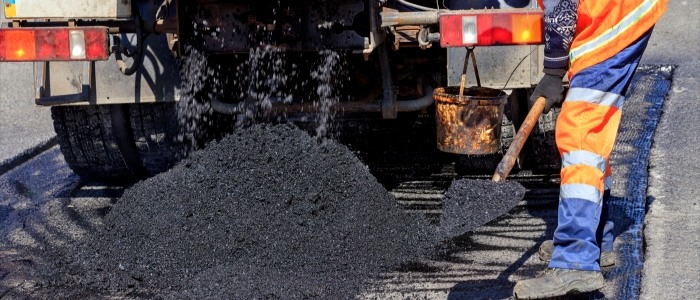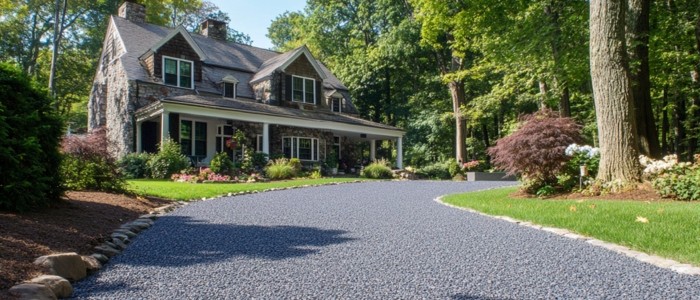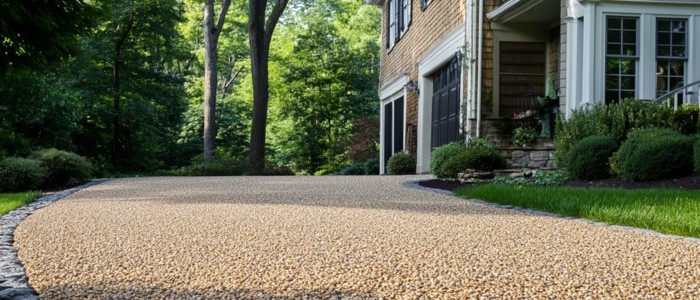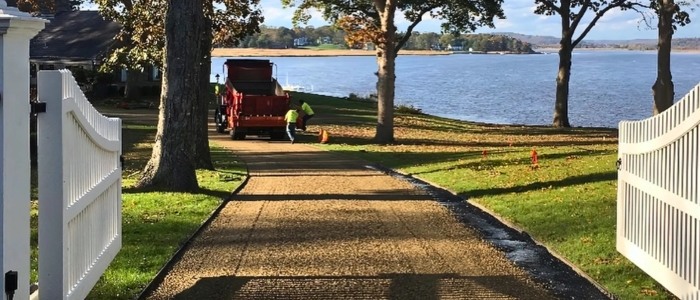Chip and Seal Driveway Cost – Affordable Paving Solution
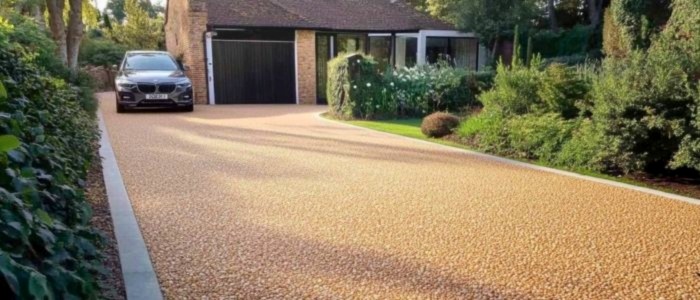
A chip and seal driveway in Connecticut offers a cost-effective and durable solution, combining asphalt’s strength with the aesthetic appeal of stone. Often called oil-and-stone, it’s an affordable alternative to traditional asphalt or concrete. According to the National Asphalt Pavement Association, chip seal is a popular choice for homeowners looking to enhance curb appeal without exceeding their budget. Understanding chip and seal driveway cost is key to making an informed decision for your property.
So, what is the typical chip and seal driveway cost in Connecticut?
The price generally ranges from $1.50 to $3.00 per square foot, with variations based on factors such as driveway size, material quality, and site preparation. To get a more accurate estimate tailored to your project, it’s recommended to consult with a local contractor.
In this article, we’ll explore everything you need to know about chip seal driveway pricing in Connecticut, including key cost factors, comparisons to other paving options, and the long-term benefits of this durable solution.
Here’s what you’ll learn in this article:
- What Is a Chip and Seal Driveway?
- Average Cost of Chip and Seal Driveways in Connecticut
- Factors That Influence Chip Seal Driveway Cost in CT
- Chip and Seal vs. Other Driveway Options in Connecticut
- Maintenance and Long-Term Cost Savings
- Choosing a Chip Seal Contractor in Connecticut
- Eco-Friendly and Sustainable Benefits
- Is Chip and Seal Right for Your CT Property?
Let’s explore the details to help you understand the true value of a chip and seal driveway for your Connecticut home.

1. What Is a Chip and Seal Driveway?
A chip and seal driveway is an affordable and durable paving option that combines asphalt with small stone chips. Often referred to as oil-and-stone, this process involves applying a layer of hot liquid asphalt to an existing surface, followed by scattering stone chips, which are then compacted to form a sturdy, textured finish. Not only does this method improve the aesthetic appeal of your driveway, but it also significantly enhances its longevity, all at a fraction of the cost of traditional asphalt or concrete.
In addition, chip seal driveways offer excellent durability and weather resistance, making them especially suitable for Connecticut’s varying climate. As a result, homeowners often choose this paving solution for its ability to improve curb appeal without stretching their budget. For more details on the benefits of this method, be sure to check out how chip seal paving works. Furthermore, compared to other driveway options, chip and seal provides long-term protection against surface wear, making it a wise investment for homeowners looking for an affordable yet durable solution.
If you’re interested in learning more or getting a personalized estimate, don’t hesitate to contact us.
2. Average Cost of Chip and Seal Driveways in Connecticut
The chip and seal driveway cost in Connecticut typically ranges from $1.50 to $3.00 per square foot. However, several factors can influence this pricing, making it important for homeowners to understand what affects the final cost.
One of the primary factors is regional labor rates. Labor costs can vary depending on the area, with urban locations generally having higher rates compared to more rural areas. Additionally, material availability plays a role in pricing, as certain types of stone chips or asphalt may be more expensive based on local supply. Furthermore, the project size and site preparation requirements also impact costs. Larger driveways or those requiring significant prep work, such as leveling or clearing, will typically cost more to pave.
By understanding these factors, homeowners can better estimate the total cost of a chip and seal driveway. For a more accurate quote, it’s best to reach out to a local contractor who can assess your specific needs. Feel free to contact us for a personalized estimate tailored to your project.
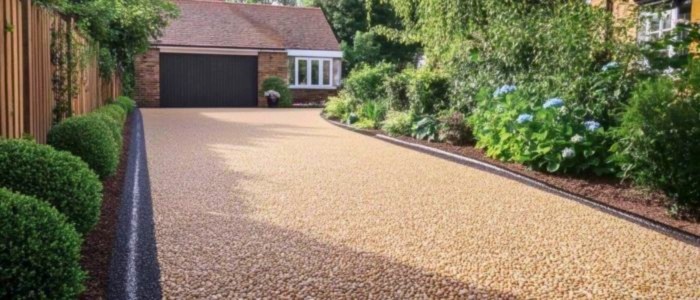
3. Factors That Influence Chip Seal Driveway Cost in CT
The chip and seal driveway cost in Connecticut can vary based on several key factors. Understanding these factors will help homeowners make informed decisions and better plan for their driveway installation. Below are the primary influences on chip and seal driveway pricing:
- Size and Layout of the Driveway: Larger driveways generally cost more to install due to the increased amount of materials and labor required.
- Type and Quality of Aggregate: The type of stone chips used can impact both the cost and the overall appearance of the driveway. Higher-quality aggregates may be more expensive but offer superior durability and aesthetic appeal.
- Existing Surface Condition: If the current driveway requires significant repair work, such as leveling or clearing debris, the cost of installation will increase.
- Access to Equipment and Crew in Rural vs. Urban CT Areas: Accessibility plays a role in cost. Rural areas may have higher costs due to transportation challenges, while urban areas might experience higher labor rates.
- Climate and Seasonal Timing: Weather conditions in Connecticut can affect installation prices. Typically, spring and summer are the best times for installation, and demand may drive costs up during peak seasons.
Here is a summary of these factors:
| Factor | Impact on Cost |
| Size and Layout | Larger driveways cost more |
| Type and Quality of Aggregate | Higher-quality aggregate increases cost |
| Existing Surface Condition | Repairing or clearing adds cost |
| Access to Equipment and Crew | Remote areas may have higher transportation or labor costs |
| Climate and Seasonal Timing | Seasonal demand can influence pricing |
For more insights on how these factors affect pricing, you can explore our detailed article on chip seal driveway pricing. Additionally, external sources such as the National Asphalt Pavement Association provide valuable information on paving costs and trends.
Understanding these factors will help you accurately assess the cost of a chip and seal driveway in Connecticut. For a more specific estimate, feel free to contact us.
Thinking About a New Chip Seal Driveway?
Request a Free Quote
Our team is ready to help you create a durable, beautiful surface that stands the test of time. Contact us today to learn more.
4. Chip and Seal vs. Other Driveway Options in Connecticut
When choosing the best driveway paving solution in Connecticut, homeowners typically weigh the chip and seal driveway cost, longevity, maintenance needs, and appearance of different materials. Here’s how chip and seal stacks up against more traditional options such as asphalt, concrete, and gravel.
Chip and Seal Driveway
- Cost: Typically ranges from $1.50 to $3.00 per square foot, making it one of the most affordable options for homeowners.
- Lifespan: Offers a solid lifespan of 10 to 15 years with minimal maintenance, making it highly cost-effective in the long run.
- Maintenance: Requires periodic resealing, but less frequently than asphalt or gravel, making it relatively low-maintenance.
- Appearance: Provides a natural, textured finish that adds curb appeal with various stone chip options. While it’s not as smooth as asphalt or concrete, it offers a rustic charm.
Asphalt Driveway
- Cost: Typically ranges from $3.00 to $6.00 per square foot, depending on factors like driveway size and material quality.
- Lifespan: Lasts around 15 to 20 years, but it needs regular maintenance to prevent cracks and potholes, such as resealing every 3-5 years.
- Maintenance: Requires more frequent maintenance than chip and seal, including crack filling and resealing every few years.
- Appearance: Asphalt provides a smooth, dark finish that looks sleek initially but can fade and crack over time.
Concrete Driveway
- Cost: The most expensive option, ranging from $6.00 to $10.00 per square foot.
- Lifespan: Concrete driveways are extremely durable, lasting 25-30 years if properly maintained, though they may develop cracks due to temperature fluctuations, especially in colder climates like Connecticut.
- Maintenance: Requires minimal maintenance, though it can crack and be costly to repair. Concrete also needs to be resealed periodically to maintain its appearance.
- Appearance: Concrete offers a smooth, clean surface and can be stamped or stained for added curb appeal. However, cracks may appear over time, reducing its visual appeal.
Gravel Driveway
- Cost: The most affordable option, typically costing between $1.00 and $3.00 per square foot.
- Lifespan: Gravel driveways typically last 5-10 years, but they require significant upkeep to maintain their level surface and prevent weed growth.
- Maintenance: Requires frequent maintenance, including leveling, replenishing gravel, and dealing with erosion. It can also attract weeds and loose stones, which can be a hassle.
- Appearance: Offers a loose, rustic look but lacks the stability of the other options. It doesn’t provide a smooth, finished appearance like asphalt or concrete.
Summary Comparison Table
| Paving Option | Cost per Square Foot | Lifespan | Maintenance | Appearance |
| Chip and Seal | $1.50 – $3.00 | 10-15 years | Minimal (resealing required) | Textured, rustic |
| Asphalt | $3.00 – $6.00 | 15-20 years | Periodic resealing & repairs | Smooth, sleek |
| Concrete | $6.00 – $10.00 | 25-30 years | Low maintenance (cracking) | Smooth, customizable |
| Gravel | $1.00 – $3.00 | 5-10 years | High maintenance (leveling) | Loose, rustic |
For more detailed guidance on choosing the best paving option for your home, you can explore our in-depth article on Chip Seal vs. Asphalt.
Considering the cost, maintenance, and aesthetic appeal of each option, chip and seal stands out as a highly cost-effective and durable choice for many Connecticut homeowners.
If you’re ready to get a personalized estimate, don’t hesitate to contact us today!

5. Maintenance and Long-Term Cost Savings
One of the main advantages of a chip and seal driveway is its relatively low maintenance and long-term cost savings, especially in Connecticut’s climate. The region’s seasonal variations—cold winters and hot, humid summers—can take a toll on driveway surfaces, but chip seals offer several benefits that help protect your investment over time.
Typical Maintenance Needs in Connecticut’s Climate
In Connecticut, the freeze-thaw cycle during winter can cause damage to traditional asphalt or concrete driveways, leading to cracks, potholes, and surface degradation. However, chip seal driveways are more resilient to these harsh conditions. The combination of stone chips and asphalt creates a strong surface that improves traction while reducing the likelihood of cracks or other weather-related damage. This durability, coupled with the relatively low chip and seal driveway cost, makes it an affordable option for homeowners seeking long-lasting protection against the elements.
While chip seal driveways require periodic maintenance, it is generally less frequent than asphalt or concrete. Homeowners can expect to apply a fresh layer of sealant every 5-7 years, depending on the amount of traffic and weather exposure.
How Chip Seal Prevents Potholes and Surface Degradation
One of the standout features of chip seal is its ability to prevent potholes and surface degradation. The combination of asphalt and stone chips provides a strong, flexible surface that can absorb the impact of vehicle traffic and Connecticut’s temperature fluctuations. Additionally, the stone chips are compacted into the asphalt, creating a durable, bonded surface that resists cracking and shifting, common issues with other paving methods like asphalt.
Reapplication and Touch-Up Cost Comparison
When it comes to reapplication, chip seal is significantly more cost-effective than asphalt or concrete. On average, homeowners can expect to pay between $0.50 and $1.00 per square foot for a reapplication of chip seal, which is much cheaper than the $1.50 to $3.00 per square foot typically required for resealing asphalt. Additionally, chip seal requires less frequent touch-ups, saving homeowners on both material and labor costs in the long run.
Here’s a comparison table of maintenance costs and reapplication frequencies:
| Paving Option | Reapplication Cost (per square foot) | Reapplication Frequency | Typical Maintenance |
| Chip Seal | $0.50 – $1.00 | Every 5-7 years | Resealing, occasional touch-ups |
| Asphalt | $1.50 – $3.00 | Every 3-5 years | Resealing, crack filling, patching |
| Concrete | $1.00 – $2.00 | Every 5-7 years | Minimal maintenance (crack sealing) |
| Gravel | $0.50 – $1.50 | Annually or as needed | Leveling, replenishing, weed control |
By investing in chip and seal, homeowners in Connecticut can save significantly on both upfront installation and long-term maintenance costs. For more information on maintenance practices and cost-effective paving options, check out this National Asphalt Pavement Association article.
If you’re looking to get started on your chip and seal driveway or need an estimate, feel free to contact us today!
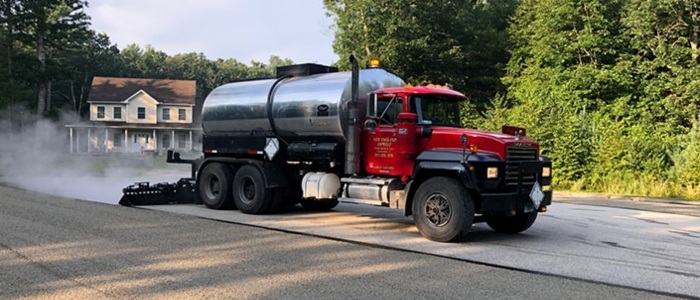
6. Choosing a Chip Seal Contractor in Connecticut
Selecting the right contractor for your chip and seal driveway is essential for ensuring quality work and durability. Here are key tips for finding a reputable local paving company.
Tips for Selecting a Reputable Contractor
- Local Experience: Choose a contractor with experience in Connecticut’s climate and terrain for optimal results.
- Licensing and Insurance: Ensure the contractor is licensed and insured to protect you during the project.
- Reviews and References: Look for positive online reviews and ask for references from past clients to gauge reliability.
Questions to Ask
- “How long have you been in business?”
- “Do you have experience with chip and seal driveways?”
- “What warranty do you offer?”
- “Can you provide a written estimate?”
Red Flags to Avoid
- Refusal to provide references or examples of previous work
- Unusually low pricing, which could indicate poor quality
- Lack of insurance coverage
Importance of Local Knowledge
A local contractor will understand Connecticut’s weather and terrain, ensuring your chip and seal driveway is built to last. For expert paving services, contact us today!

7. Eco-Friendly and Sustainable Benefits
One of the often-overlooked advantages of a chip and seal driveway is its eco-friendly nature. This paving solution not only offers durability and cost-effectiveness, but it also incorporates sustainable practices that benefit both the environment and your wallet.
Use of Recycled Materials
Chip seal driveways often use recycled asphalt, which reduces the need for new raw materials. This sustainable approach lowers the environmental impact of your paving project by reusing existing materials and minimizing waste.
Low Energy Consumption in Application
Compared to traditional asphalt or concrete, chip and seal requires significantly less energy during the application process. The method of applying hot asphalt and stone chips uses fewer resources, resulting in a lower carbon footprint.
Stormwater Runoff Benefits
The porous nature of chip seal helps manage stormwater runoff, preventing water from pooling and eroding your driveway. This environmentally friendly feature reduces the risk of flooding and minimizes the impact on local water systems.
Here’s a summary of the eco-friendly benefits:
| Eco-Friendly Benefit | Description |
| Use of Recycled Materials | Reduces the need for new raw materials by reusing asphalt. |
| Low Energy Consumption | Requires less energy to apply compared to asphalt and concrete. |
| Stormwater Runoff Benefits | Porous surface allows water to drain, reducing flooding risk. |
For more information on the environmental benefits of chip seal, you can visit the National Asphalt Pavement Association.
By choosing a chip and seal driveway, you’re not only investing in a durable and affordable solution but also contributing to a more sustainable future. To get started with your eco-friendly paving project, contact us today!

8. Is Chip and Seal Right for Your CT Property?
Chip and seal driveways are a versatile, cost-effective paving option, but they may not be the best fit for every property. Understanding the ideal property types and typical use cases can help you determine if this paving solution suits your needs.
Ideal Property and Driveway Types
Chip seal is most suitable for driveways that receive moderate to heavy traffic. It works well on both flat and slightly sloped surfaces, providing excellent durability and grip. If your driveway is located in a rural or suburban area with high vehicle use, chip and seal is an ideal choice due to its resilience and affordability, especially when considering the chip and seal driveway cost. However, for highly trafficked urban driveways with constant wear or heavy commercial vehicles, other options like asphalt or concrete may offer better longevity. You can explore more on the differences in our Chip Seal vs. Asphalt article.
Common Use Cases in Rural, Suburban, and Semi-Urban CT Settings
- Rural Properties: Chip seal driveways are a popular choice for rural homes where long, winding driveways are common. The affordable cost and ability to withstand the challenges of rural roads make this an ideal solution.
- Suburban Areas: In suburban settings, chip seal provides a cost-effective option for homeowners looking to boost curb appeal without the high price of asphalt or concrete. Its textured finish also helps with traction, especially during Connecticut’s snowy winters. For more on how chip seal can improve your driveway’s durability, check out our Chip Seal Driveway Maintenance.
- Semi-Urban Areas: In semi-urban areas, where traffic levels are moderate, chip and seal offers a great balance between affordability, durability, and aesthetics.
If you’re unsure whether chip and seal is the best choice for your property, feel free to reach out to us for personalized advice and a free consultation. Contact us today to learn more about this cost-effective paving solution and how it can benefit your Connecticut home.
FAQs
Yes, a chip seal driveway is a worthwhile investment for many homeowners. It provides a durable, cost-effective solution for improving both the appearance and functionality of your driveway. With proper maintenance, chip and seal can last for years, offering great value compared to other paving options like asphalt or concrete.
A chip seal driveway typically lasts between 10 to 15 years, depending on factors such as traffic, weather conditions, and the quality of materials used. Regular maintenance, such as resealing every 5-7 years, can help extend its lifespan and keep it looking great.
Yes, chip and seal is generally more affordable than traditional asphalt. While asphalt usually costs between $3.00 and $6.00 per square foot, chip seal typically ranges from $1.50 to $3.00 per square foot, offering significant savings.
The lifespan of a chip seal driveway is typically 10 to 15 years, with periodic maintenance like resealing, helping to maintain its durability and prevent surface degradation from weather and traffic.
Thinking About a New Chip Seal Driveway?
Request a Free Quote
Our team is ready to help you create a durable, beautiful surface that stands the test of time. Contact us today to learn more.
Conclusion
Choosing a chip and seal driveway is a smart, cost-effective decision for homeowners looking to enhance the appearance and durability of their property. Offering significant cost savings, long-term durability, and a customizable aesthetic, it’s a reliable and affordable paving solution for various needs. For personalized guidance and a free estimate, don’t hesitate to contact us.
Our team at New England Asphalt is ready to help you make the best choice for your driveway!

